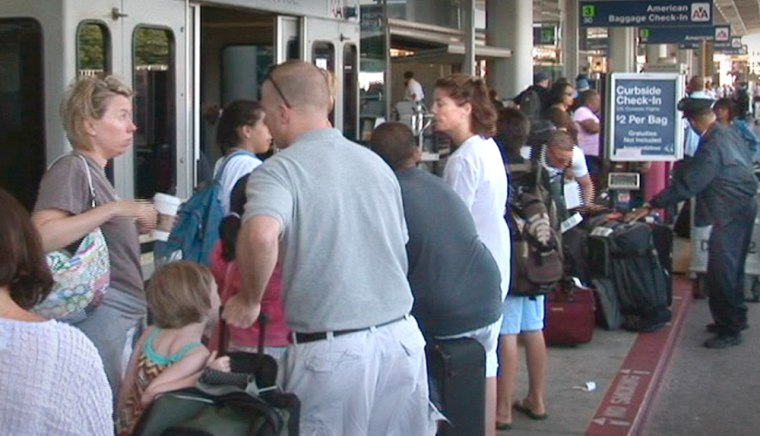The travel industry is sinking billions of dollars into technology like online booking tools, check-in kiosks and phone systems that recognize your voice, promising it will make you next trip easier than ever.
But is improving your travel experience — or just their bottom line?
Say you want to buy a plane ticket, for example. Your best bet is to fire up a PC, log on to the Internet, surf over to an airline’s Web page and hunt for a reasonable fare. Phew. Whatever happened to just calling an agent? You can still do that. But it’ll cost extra.
Renting a car or checking into a hotel is being left to machines, too. Even calling a company is not as straightforward as it used to be, because you have to navigate a maze of options before you can talk to a real person. If you’re lucky, that is.
Call it an inconvenient convenience. Vacations have become hard work.
You would expect this kind of hyper-automation from a bank or a wireless phone company. But removing people from a business that prides itself on its hospitality seems kind of … well, inhospitable.
Perhaps the biggest shift from “how can we help you?” to “help yourself” has happened in the reservations department. Not so long ago, you could call a company and get connected to a friendly agent who spoke good English and make a booking without asking you to pay a penny more.
But travel companies, particularly airlines, discovered they could save money by encouraging their customers to book online, outsourcing their call centers and charging passengers more for making a reservation through an offshore phone agent you can’t clearly understand. Good for the airlines. But can someone explain how this type of automation makes your trip any easier?
It could be worse, though. You could still be trying to navigate the confusing branches of a travel company’s phone tree. The travel industry has set up voice-recognition systems for our “convenience” that just irritate us, if a recent call-center report card issued by a site called Gethuman is to be believed. The site scored companies on their phone systems’ ease of use, their ability to “listen” to customers and their efficiency. It gave the call centers run by airlines like American Airlines, Delta Air Lines and United Airlines “F”s. Hotels only did slightly better, but some still flunked — Four Points by Sheraton, Marriott International and Ramada, among them.
As both a traveler who has had the misfortune of being lost in one of these phone mazes, and as an advocate for passengers who listen to countless complaints about the systems, I can’t decide which is worse: talking to a machine that doesn’t understand you or talking to an offshore phone agent who doesn’t understand you. Either way, it’s hard to find an upside for the average traveler.
All of which brings us to self-service kiosks. They’re terrific for some airline passengers, hotel guests and car renters — when they work. Paul Heymont, an assistant principal from Brooklyn, N.Y., rented a car in Denver recently, where he came face-to-face with such a machine. “There were too many unexplained options, too many different kinds of boxes and buttons to click — and on the final page, where the charges for overtime are shown, it looked as if it was part of the total price.” Frustrated, he ended up waiting in a long line to speak with a real person.
It isn’t unusual to arrive at the airport to find several check-in kiosks that don’t work because of a yet-to-be-diagnosed system glitch, or to arrive in a hotel and notice that the check-in machine isn’t running because someone forgot to refill the paper. And when they are working, passengers are segregated by their ability to use a touchscreen. Those that can operate a computer stand in a line and interact with the kiosk. Those that can’t, or would just rather deal with a human being, have to queue up in a longer line. Is this really more convenient?
Travel companies want their customers to think of call centers and kiosks as a “win-win” proposition. But the fact is, they’re the only clear winners, at least in the short term. They are able to cut staff and save money when they introduce kiosks, Web booking and call center technology.
Over-automating the travel business is bad news for people, though. Removing the personal touch forces us to work harder when we’re on the road. That’s exasperating, infuriating and sometimes embarrassing. And over the long term, it’s likely to drive us away from these companies that have poured money into technology at the expense of customer service. It's time these airline, hotel and car rental companies realize there are still some things a machine can't replace.
I’ll be taking a close look at what makes the travel business tick in this column that appears here every Monday. are always welcome, and if you can’t get enough of my column, for daily insights into the world of travel.
